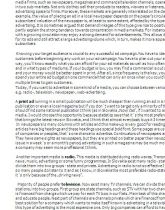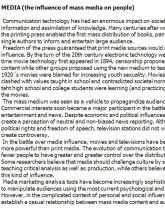Hľadaj
Zobraz:
Univerzity
Kategórie
Rozšírené vyhľadávanie
45 171
projektov
A comparison of the effect of advertising in various types of media
| Prípona .doc |
Typ seminárna práca |
Stiahnuté 3 x |
| Veľkosť 0,1 MB |
Jazyk anglický |
ID projektu 6005 |
| Posledná úprava 02.08.2017 |
Zobrazené 2 877 x |
Autor: intangity |
 Zdieľaj na Facebooku
Zdieľaj na Facebooku |
||
| Detaily projektu | ||
- cena:
15 Kreditov - kvalita:
89,9% -
Stiahni
- Pridaj na porovnanie
- Univerzita:Paneurópska vysoká škola
- Fakulta:Fakulta ekonómie a podnikania
- Kategória:Jazyky » Angličtina
- Predmet:Komunikácia v anglickom jazyku
- Študijný program:-
- Ročník:1. ročník
- Formát:MS Office Word (.doc)
- Rozsah A4:6 strán
Communication technology has had an enormous impact on society by changing the distribution of information and assimilation of knowledge. Many centuries after writing was invented, the technology of the printing press enabled the first mass distribution of books, pamphlets and newspapers that allowed single authors to inform and entertain large audience.
Freedom of the press guaranteed that print media sources would continue providing information and influence. By the turn of the 20th century electronic technology was at the center of society. From the time movie technology first appeared in 1894, censorship proponents bought to limit criminal and sexual content while other groups proposed using the new medium to teach social ideology. As early as the 1920´s movies were blamed for increasing youth sexuality. Movies were seen as reality - makers taht clashed with values taught in school and contradicted societal norms. Studies during that time revealed taht high school and college students were learning (and practicing) sexual techniques they had seen in the movies.
Freedom of the press guaranteed that print media sources would continue providing information and influence. By the turn of the 20th century electronic technology was at the center of society. From the time movie technology first appeared in 1894, censorship proponents bought to limit criminal and sexual content while other groups proposed using the new medium to teach social ideology. As early as the 1920´s movies were blamed for increasing youth sexuality. Movies were seen as reality - makers taht clashed with values taught in school and contradicted societal norms. Studies during that time revealed taht high school and college students were learning (and practicing) sexual techniques they had seen in the movies.
Kľúčové slová:
communication
information
technology
newspaper
print media
web
advertising
anglický jazyk
Obsah:
- Media (the influence of mass media on people)
Web Advertising Versus Newspaper Advertising
Sources
Zdroje:
- Bolton, Ruth and Katherine Lemon, (1999), “A Dynamic Model of Customer Usage of Services: Usage as anAntecedent and Consequence of Satisfaction,” Journal of Marketing Research, 36 (May)
- Strömberg, D., 1998, Measuring Mass-Media’s Impact on Public Policy, mimeo, Institute for international Economic Studies, Stockholm University and Department of Economics, Princeton University.
- Internet






